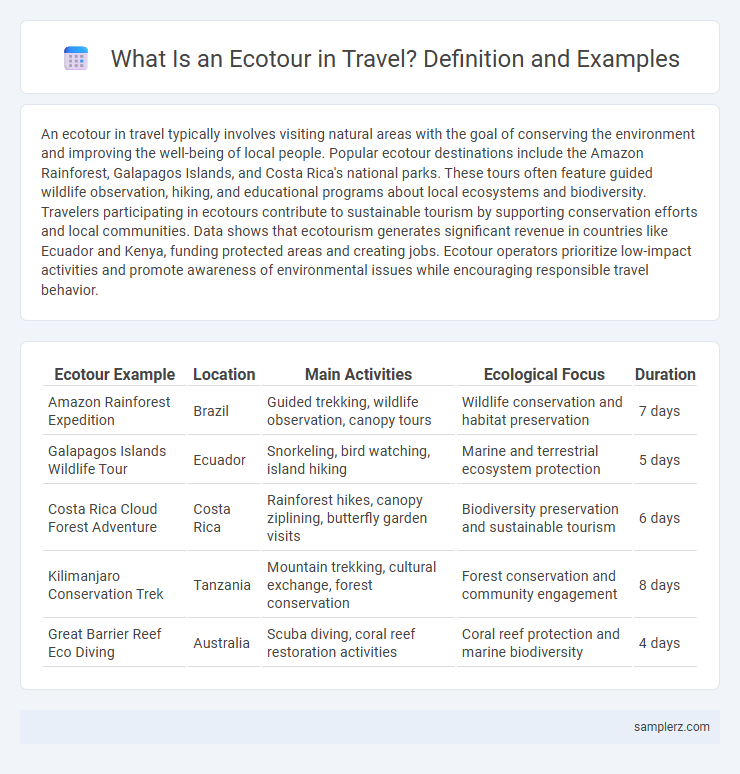An ecotour in travel typically involves visiting natural areas with the goal of conserving the environment and improving the well-being of local people. Popular ecotour destinations include the Amazon Rainforest, Galapagos Islands, and Costa Rica's national parks. These tours often feature guided wildlife observation, hiking, and educational programs about local ecosystems and biodiversity. Travelers participating in ecotours contribute to sustainable tourism by supporting conservation efforts and local communities. Data shows that ecotourism generates significant revenue in countries like Ecuador and Kenya, funding protected areas and creating jobs. Ecotour operators prioritize low-impact activities and promote awareness of environmental issues while encouraging responsible travel behavior.
Table of Comparison
| Ecotour Example | Location | Main Activities | Ecological Focus | Duration |
|---|---|---|---|---|
| Amazon Rainforest Expedition | Brazil | Guided trekking, wildlife observation, canopy tours | Wildlife conservation and habitat preservation | 7 days |
| Galapagos Islands Wildlife Tour | Ecuador | Snorkeling, bird watching, island hiking | Marine and terrestrial ecosystem protection | 5 days |
| Costa Rica Cloud Forest Adventure | Costa Rica | Rainforest hikes, canopy ziplining, butterfly garden visits | Biodiversity preservation and sustainable tourism | 6 days |
| Kilimanjaro Conservation Trek | Tanzania | Mountain trekking, cultural exchange, forest conservation | Forest conservation and community engagement | 8 days |
| Great Barrier Reef Eco Diving | Australia | Scuba diving, coral reef restoration activities | Coral reef protection and marine biodiversity | 4 days |
Top Ecotour Destinations for Sustainable Travelers
Costa Rica stands out among top ecotour destinations for sustainable travelers due to its extensive national parks and biodiversity, including Monteverde Cloud Forest and Tortuguero National Park. New Zealand offers immersive ecotour experiences in Fiordland National Park, where visitors can engage in eco-friendly hiking and wildlife watching while supporting conservation efforts. In Tanzania, the Serengeti and Ngorongoro Crater provide responsible safari options that promote wildlife preservation and local community benefits.
Unique Wildlife Encounters on Ecotours
Ecotours offer unique wildlife encounters such as guided safaris in African savannas where travelers observe lions and elephants in their natural habitats. In the Amazon Rainforest, ecotourists experience close interactions with rare bird species and river dolphins while supporting conservation efforts. These tours emphasize sustainable practices, ensuring minimal environmental impact while fostering appreciation for biodiversity.
Community-Based Ecotours That Empower Locals
Community-based ecotours in destinations like Costa Rica's Osa Peninsula immerse travelers in conservation efforts while supporting indigenous communities, promoting sustainable tourism. These tours often include guided nature walks led by local experts, cultural exchanges, and participation in reforestation projects, ensuring that tourism revenue directly benefits residents. Empowering locals through these ecotourism initiatives fosters environmental stewardship and economic resilience in fragile ecosystems.
Rainforest Conservation Ecotours: Explore & Protect
Rainforest Conservation Ecotours offer immersive experiences in biodiversity hotspots like the Amazon or Borneo, promoting habitat preservation while supporting local communities. Participants engage in guided treks, wildlife observation, and reforestation projects that contribute to sustainable tourism and environmental education. These ecotours emphasize minimal ecological impact and foster awareness of endangered species and deforestation challenges.
Marine Ecotourism: Preserving Ocean Ecosystems
Marine ecotourism offers immersive experiences like guided snorkeling and whale watching that promote awareness of ocean conservation. Participants engage with coral reefs and marine wildlife while supporting sustainable practices that minimize environmental impact. These tours contribute to preserving biodiversity and fostering local community stewardship of fragile marine ecosystems.
Cultural Immersion Through Eco-Friendly Travel
Participating in ecotours that emphasize cultural immersion allows travelers to experience indigenous traditions while contributing to local conservation efforts. These eco-friendly travel options often include homestays with native communities, guided nature walks highlighting sustainable practices, and workshops on traditional crafts or cuisine. Engaging in such responsible tourism supports both environmental preservation and the empowerment of local cultures.
Responsible Adventure: Low-Impact Ecotour Options
Choosing low-impact ecotour options such as guided wildlife safaris in protected reserves and community-led hiking tours helps preserve natural habitats and supports local economies. Responsible adventure travel emphasizes minimizing environmental footprints by using eco-friendly transportation and sustainable accommodations certified by recognized organizations like Green Globe or EarthCheck. Engaging in carbon-neutral activities and respecting indigenous cultures ensures a meaningful experience while protecting biodiversity for future generations.
Eco-Lodges and Sustainable Accommodation Guides
Eco-lodges provide eco-friendly accommodations that minimize environmental impact through renewable energy use, waste reduction, and local resource sourcing. Sustainable accommodation guides, such as Green Key and EarthCheck, certify properties meeting strict ecological and social responsibility standards. These options offer travelers immersive nature experiences while supporting conservation and local communities.
Volunteer Ecotourism: Make a Difference on Your Trip
Volunteer ecotourism offers travelers a unique opportunity to contribute to environmental conservation and local communities while exploring natural destinations. Examples include participating in wildlife monitoring projects in Costa Rica, reforestation efforts in Madagascar, or coral reef restoration in Australia's Great Barrier Reef. These hands-on experiences combine meaningful volunteer work with sustainable travel practices, promoting ecological preservation and cultural exchange.
Planning the Perfect Ecotour: Tips for Sustainable Travel
Choosing destinations with established conservation efforts, such as Costa Rica's protected rainforests or Kenya's wildlife preserves, ensures meaningful ecotourism experiences. Booking eco-friendly accommodations that utilize renewable energy and support local communities enhances sustainable travel impact. Incorporating low-impact activities like guided nature walks and wildlife observation promotes environmental awareness while minimizing ecological footprints.

example of ecotour in travel Infographic
 samplerz.com
samplerz.com